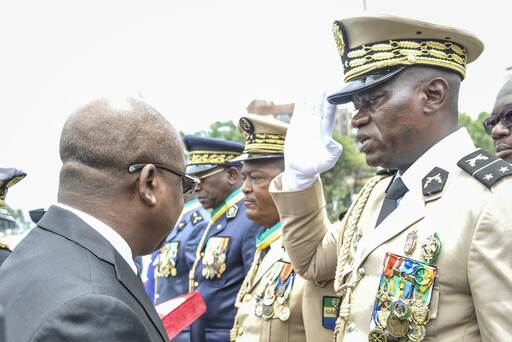LIBREVILLE, Gabon - The general who led the overthrow of the 55-year Bongo dynasty will be sworn in on Monday as transitional president of the west African state, the army announced.
The military sought to reassure donors they would "respect all commitments" at home and abroad and "phase in" transitional institutions, Colonel Ulrich Manfoumbi Manfoumbia, spokesman for the new regime, said on state television.
The swearing in of General Brice Oligui Nguema would take place at the consitutional court.

It was the indication about how the new Committee for the Transition and Restoration of Institutions (CTRI) would operate following Wednesday's putsch.
President Ali Bongo Ondimba, whose father Omar held power for more than four decades, was toppled moments after being declared outright winner in bitterly disputed weekend elections.
Amid scenes of joy in the oil-rich state, the coup leaders had named the head of the elite Republican Guard, General Brice Oligui Nguema, as Gabon's "transitional president."
They also restored internet access and broadcasts by three influential French media that had been cut off by Bongo's government on Saturday evening.
But they imposed a 6:00 pm to 6:00 am curfew "to maintain calm and serenity" and Gabon's borders remained closed.
"The transition must happen quickly," said Jasmine Assala Biyogo, 35, who owns a small central Libreville bar.
There were few outward signs of the political turmoil on the capital's streets.
Long queues formed at bakeries and armoured vehicles blocked access roads to Bongo's residence where heavily armed Republican Guards were seen.
Opposition seeks election win
The opposition Alternance 2023 alliance had remained silent since the coup but on Thursday called on the putschists to acknowledge that it had won the election.
The alliance "invited the defence and security forces to the discussion so as to work out... the best solution," following the vote.
Led by university professor Albert Ondo Ossa, Alternance had earlier accused Bongo of "fraud" and demanded he hand over power "without bloodshed".
Five other countries in Africa -- Mali, Guinea, Sudan, Burkina Faso and Niger -- have undergone coups in the last three years, with their new rulers resisting demands for a short timetable for returning to barracks.
Bongo's fate remains unclear but the CTRI, which includes the heads of all army corps, said he had been put under house arrest and "placed in retirement".
After decades with a playboy image, Bongo was elected in 2009 following the death of his father, who reputedly amassed a fortune from Gabon's oil wealth.
In 2016 he was re-elected -- again in fiercely disputed conditions -- before suffering a stroke in 2018 that weakened his grip on power.
Election trigger
The coup announcement came just moments after the national election authority declared Bongo had won a third term in Saturday's election with 64.27 percent of the vote.
The poll, condemned as bogus by the opposition, was declared cancelled by the new CTRI leaders.
The elections "did not meet the conditions for a transparent, credible and inclusive ballot so much hoped for by the people of Gabon", they said in a statement.
"Added to this is irresponsible and unpredictable governance, resulting in a continuing deterioration in social cohesion, with the risk of leading the country into chaos."
The takeover sparked condemnation from the African Union (AU) which said it was holding a meeting on Gabon on Thursday.
"Now -- AU Peace & Security Council meets to consider the situation in Gabon," the body said in a statement on X, formerly Twitter.
Nigeria has warned of Africa's "contagious autocracy".
France, where Bongo's loss would mark a further blow to Paris' influence in Africa, condemned the coup and renewed calls "to see the results of the election respected, once they are known".
But other reactions were more nuanced, focussing on the credibility of the vote itself.
"Naturally, military coups are not the solution, but we must not forget that in Gabon there had been elections full of irregularities," said the European Union's foreign policy chief, Josep Borrell.
A rigged vote could amount to a civilian "institutional coup," he said.
The US State Department said it was "strongly opposed to military seizures" but voiced concerns over the "lack of transparency and reports of irregularities surrounding the election".
The elections were held without international observers, and foreign journalists had been largely restricted from covering the event, according to the media watchdog Reporters Without Borders (RSF).